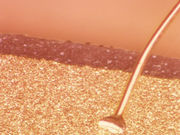Afatinib therapy linked to earlier paronychia onset; more dermatological visits for skin toxic effects
FRIDAY, Dec. 11, 2015 (HealthDay News) — For patients with non-small-cell lung cancer, treatment with epidermal growth factor receptor tyrosine kinase inhibitors (EGFR-TKIs) is associated with skin toxic effects, according to a research letter study published online Dec. 10 in JAMA Dermatology.
Kai-Lung Chen, M.D., from the National Taiwan University Hospital in Taipei, and colleagues conducted a retrospective study to compare the incidences and severities of the four types of skin toxic effects for three different EGFR-TKIs. Data were included for 146 patients with non-small-cell lung cancer meeting the inclusion criteria; of these, 61, 117, and 93 had ever received gefitinib, erlotinib, and afatinib, respectively.
The researchers found that the incidence of acneiform eruption was highest, followed by pruritus and xerosis (67.2 to 76.3 percent and 47.5 to 63.4 percent, respectively). Paronychia incidence was the lowest and varied significantly among the EGFR-TKIs: 9.8, 12.8, and 39.8 for gefitinib, erlotinib, and afatinib, respectively (P < 0.001). For patients with treatment courses extending at least 180 days, afatinib therapy correlated with earlier paronychia onset and with more dermatologic visits within the first 180 days for any skin toxic effects.
“Aggressive dermatologic care for patients receiving EGFR-TKIs should be mandatory,” the authors write.
One author disclosed financial ties to the pharmaceutical industry.
Full Text (subscription or payment may be required)
Copyright © 2015 HealthDay. All rights reserved.








